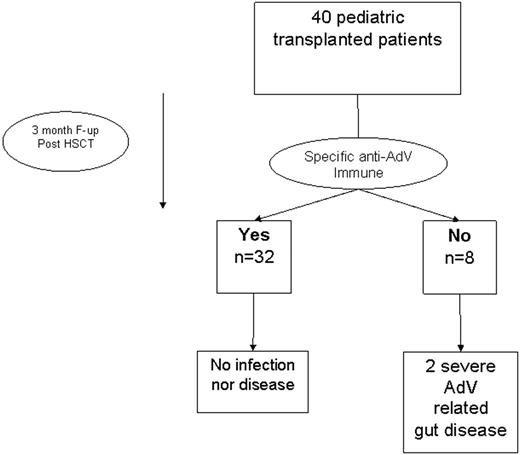Abstract
Abstract 1145
Poster Board I-167
Correlations between host AdV-specific immunity and the risk of AdV-associated complications remain to be clarified for improving patients care in allogeneic hematopoietic-stem cell transplantation (HSCT) setting, particularly for pediatric patients. In immunocompromised individuals, high number of AdV-specific IFNg secreting T-cells appears to be associated with AdV control. Infusion of IFNg-secreting AdV-specific T-cells has been shown to cure patients with severe AdV infection. We realized an in vitro study to correlate host cellular immune response and AdV associated complications.
In this study, CD4+ T-cell AdV-specific immune-recovery was relied to AdV-infection in 40 pediatric patients (median age: 7.60 years) who underwent allogeneic HSCT after either Bu-based or TBI-based fully myelo-ablative conditioning regimen. HSCT were performed for haematological malignancies. Patients received CSA +/- short course MTX as GvHD prophylaxis. Monitoring for AdV infection in transplanted patients consisted of weekly PCR during at least the first 3 months following HSCT. Antiviral chemotherapy was initiated if AdV-DNA levels were over 2000 copies/ml. Blood samples from 34 healthy children (median age: 5.4 years) and 31 healthy adults were analyzed as reference. Proliferative-responses were assessed by 3HT incorporation and cytokine-responses by intracytoplasmic flow-cytometry assay.
38 of 40 transplanted patients did not evidence AdV in the blood and/or clinical symptoms of AdV infection at any time post-HSCT. Recovery of cellular immunity toward the virus was observed in 32 out of those (84%) (since M1 post-HSCT, n=10; since M3, n=16; since M6, n=4; or since M12, n=2). IFNg-secreting CD4+ T-cell mostly developed at M1-M3 post-HSCT with yet optimal levels (1.5 cell/ml of blood, range:0.05-8.2 in transplanted patients at M3 vs 1.2 cell/ml range:0.56-2.4 in age-matched healthy children).
In contrast, 2 of 40 patients developed severe gut AdV infection at D73 and D75 post HSCT, respectively. None of them developed any AdV immunity before M6.
26 of 34 healthy children exhibited cellular immunity with level intensities of proliferative-responses (median cpm: 34 360), and percentages of IFNg secreting CD4+ T-cell (median:0.12%, range: :0.04 to 0.39) similar as in healthy adults (median cpm: 47 500, 0.13% range:0.04-0.69). These CD4+ T-cells are mainly polyfunctional IFNg/IL2-secreting cells (median 0.09% in both healthy children and adults).
In conclusion,
Healthy adult values can be used as reference for patients more than 2 years of age when healthy children values are not available.
The presence of AdV if associated with specific immunity i.e.1.5 AdV-specific IFNg secreting CD4 T-cells per ml of blood within the 1st trimester post-HSCT, does not seem to translate into AdV related disease. If confirmed, this observation could lead to spare these patients from aggressive treatment.
No relevant conflicts of interest to declare.
Author notes
Asterisk with author names denotes non-ASH members.


This feature is available to Subscribers Only
Sign In or Create an Account Close Modal